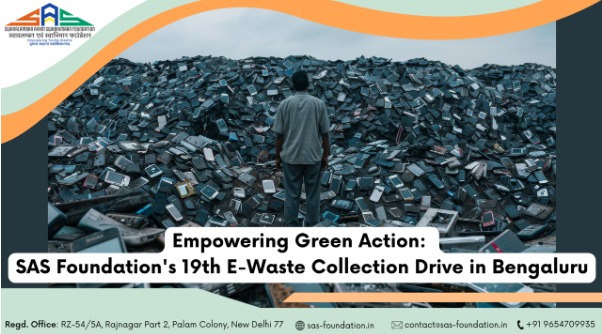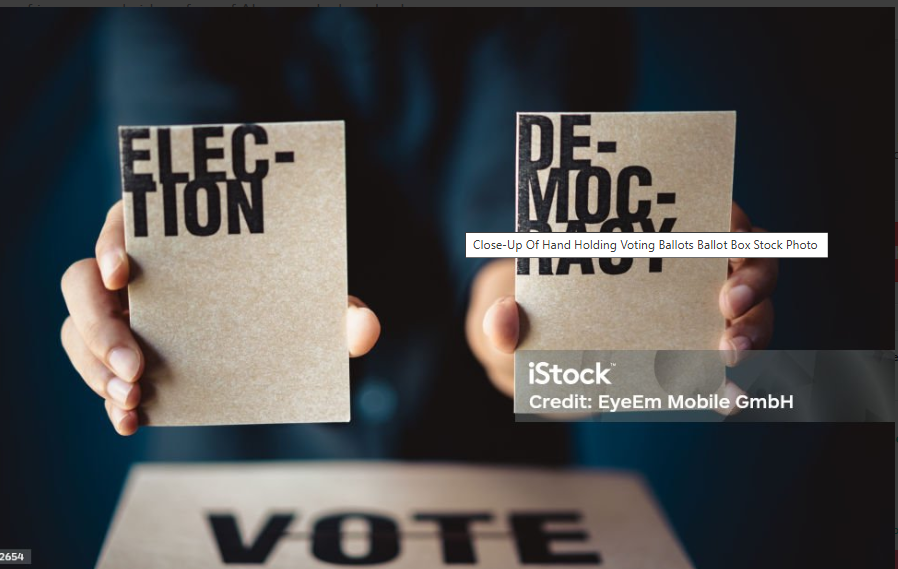Tackling the E-Waste Crisis: A Call for Sustainable Action on World Environment Day
This World Environment Day, the Swavalamban Avam Swabhimaan Foundation (SAS Foundation), in collaboration with #JVEdTechMedovation and Attero, hosted a thought-provoking Virtual E-Waste Management Summit. The summit brought together experts, changemakers, and youth leaders to address one of the most urgent environmental challenges of our time—electronic waste, or e-waste.
The summit featured insightful contributions from an esteemed panel of experts, including Dr. Jyoti Dongre Rao, Dr. Nitin Saini, and Mr. Shiv Chander Jha, who engaged in a deeply impactful conversation on the theme: “Sustainable Solutions to India’s E-Waste Crisis.”
Understanding the E-Waste Problem
E-waste includes discarded electronic devices such as computers, mobile phones, televisions, and other gadgets. India is currently the third-largest producer of e-waste in the world, generating over 3.2 million metric tonnes annually, and this figure is expected to rise rapidly with growing digitalization and technological consumption.
But why is e-waste so dangerous?
Environmental Threat: E-waste contains toxic materials such as lead, cadmium, and mercury. If not disposed of properly, these toxins seep into soil and water, damaging ecosystems and wildlife.
Human Health Risks: Exposure to hazardous e-waste components can lead to serious health issues, including respiratory problems, kidney failure, and neurological disorders.
Informal Recycling: Most e-waste in India is processed in informal sectors using unscientific methods, which worsen both environmental and human health impacts.
Low Awareness: Despite increasing gadget usage, awareness about safe e-waste disposal remains alarmingly low among the public.
Why This Summit Mattered
The Virtual E-Waste Management Summit was not just an event but a movement towards making India more responsible in its handling of e-waste. With participants from across the country, the summit aimed to:
Raise awareness about the environmental and health dangers posed by e-waste.
Advocate for sustainable disposal and recycling practices.
Encourage community participation, particularly among youth and educational institutions.
Highlight successful models and solutions, such as those implemented by SAS Foundation and Attero.
Key Takeaways from the Panel
Dr. Jyoti Dongre Rao, a seasoned environmentalist, emphasized the importance of creating circular economies. She stated,
“The problem isn’t technology—it’s how we dispose of it. If every individual becomes aware of their role in the life cycle of a device, we can significantly reduce e-waste pollution.”
Dr. Nitin Saini, representing the SAS Foundation, shared inspiring insights into the foundation’s grassroots work.
“We’ve reached over 90,000 individuals, across schools, colleges, and rural areas, educating them on the dangers of e-waste. Through collection drives, tree plantation campaigns, and awareness sessions, we’re building a green future—one step at a time.”
Dr. Saini also highlighted how the SAS Foundation has worked tirelessly to link education, environmental action, and community leadership. The foundation’s programs empower youth to lead local e-waste collection and conduct door-to-door awareness drives—turning students into Green Champions.
Mr. Shiv Chander Jha, a sustainability advocate, spoke on the need for strong public-private partnerships and government intervention.
“India needs a structured e-waste policy that encourages formal recycling and penalizes unsafe disposal. Tech companies must be made accountable through Extended Producer Responsibility (EPR).”
The Role of Policy and Innovation
A key point of the discussion was the urgent need for effective e-waste management policies. Although India has the E-Waste (Management) Rules, 2016, implementation and enforcement remain weak. There’s a lack of standardized collection centers, and most people are unaware of the proper channels for disposal.
Panelists agreed on the need to:
Strengthen EPR compliance from manufacturers and distributors.
Promote tech-driven solutions such as AI-based waste tracking and mobile collection units.
Provide incentives to certified recyclers and create more employment opportunities in the green sector.
Integrate e-waste management into school and college curriculums.
SAS Foundation’s Impact So Far
The SAS Foundation has been a pioneer in environmental education and community engagement. On-ground volunteers, educators, and interns work across India to promote sustainable behaviors. Some of the foundation’s flagship initiatives include:
Green Champion Internship Program: Trains youth to lead sustainability campaigns in their communities.
E-Waste Collection Drives: In partnership with local governments and NGOs, these drives have collected thousands of discarded devices and safely recycled them.
Tree Plantation Campaigns: Over 10,000 trees planted in collaboration with schoolchildren and volunteers.
Workshops and Webinars: Delivered across schools, corporates, and social platforms to spread awareness on e-waste, water conservation, and climate action.
Why Your Participation Matters
This summit reminded us that solving the e-waste crisis is not the job of a few—it’s the responsibility of all. Whether you are a student, teacher, IT professional, or homemaker, your choices matter.
Here’s how you can contribute starting today:
Don’t throw away old electronics—find an authorized recycler or collection drive.
Encourage your school, college, or office to partner with organizations like the SAS Foundation.
Spread the word. Awareness is the first step toward action.
Participate in tree planting and clean-up drives in your neighborhood.
Support policies and initiatives that prioritize environmental sustainability.
The Road Ahead
As the summit concluded, there was a collective sense of urgency but also a sense of hope. With the right mix of awareness, action, and accountability, we can reduce the harmful impact of e-waste and create a healthier planet for future generations.
The SAS Foundation, along with its partners like Attero and JVEdTechMedovation, continues to lead from the front, but they can’t do it alone.
We invite you to join our movement. Whether by volunteering, educating others, or simply making more conscious choices about your electronics, you can be part of the solution.
🌍 Let’s Choose to Act. Let’s Choose to Care. Let’s Choose a Greener Tomorrow.
Curious to dive deeper into the discussion?
📖 Click here to read more and discover how you can be a changemaker in your community.
🔔 Subscribe to our newsletter to receive more inspiring stories, event invites, and sustainability updates.









